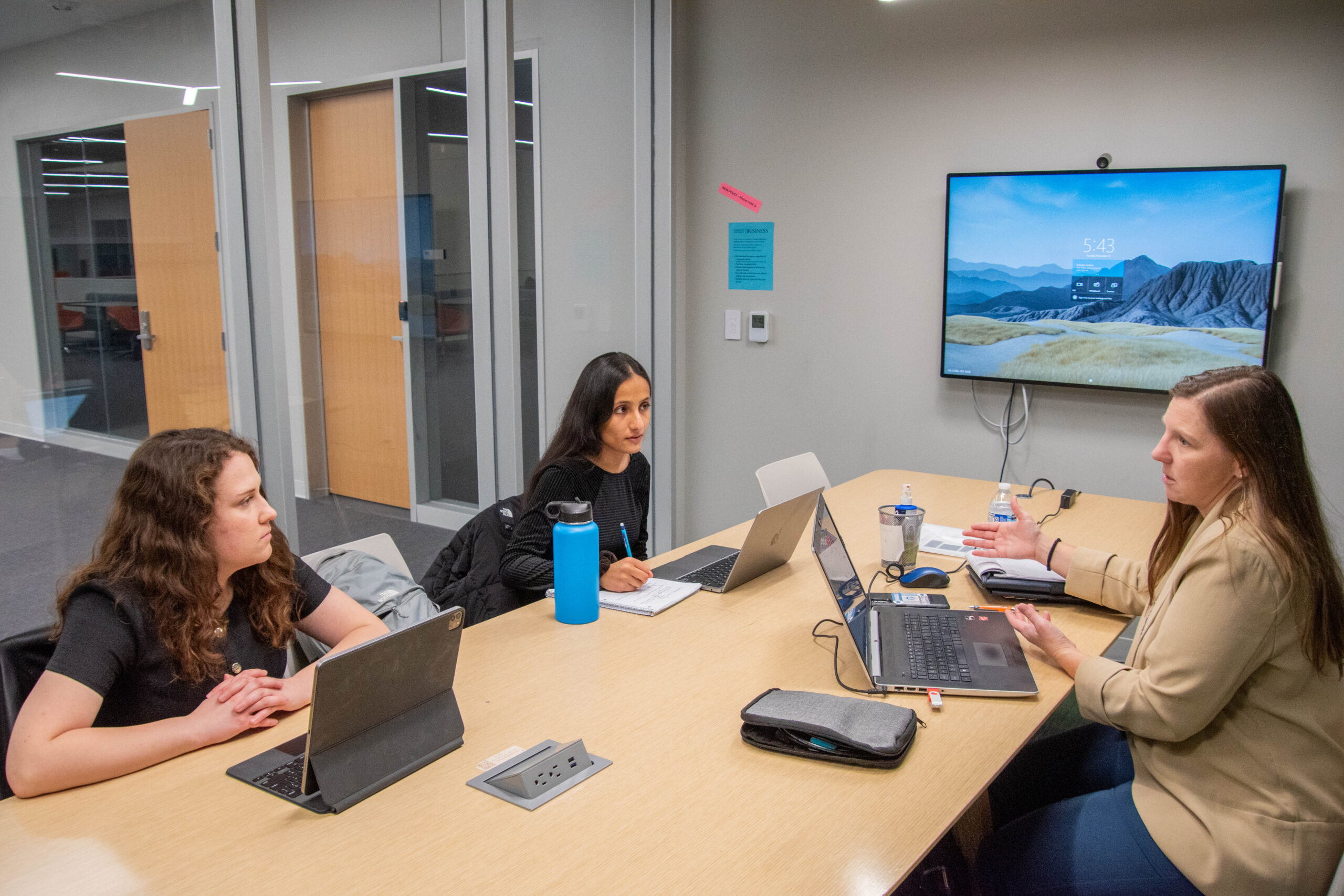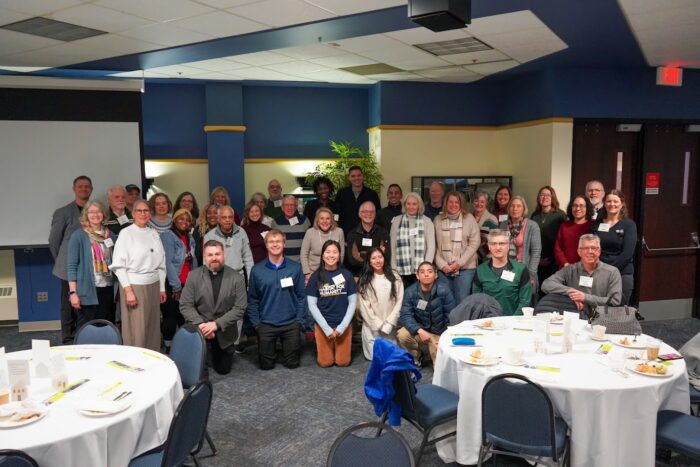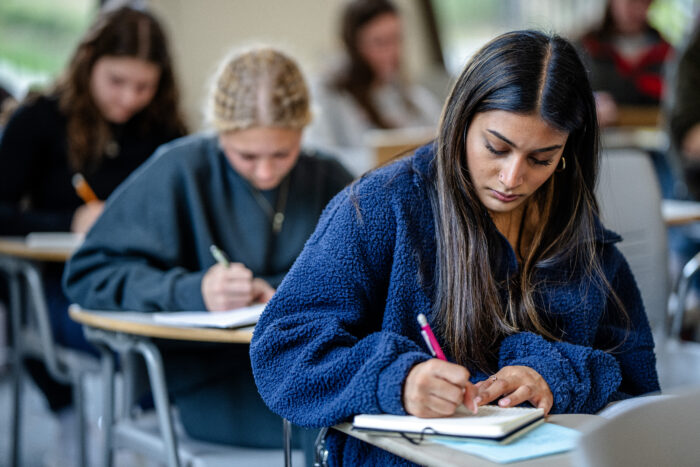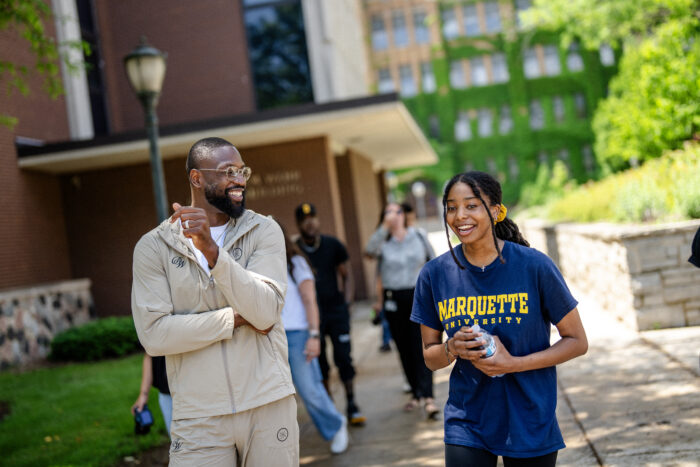For most students, academic pressure manifests in a final exam. For Brittany Mani, pressure is knowing that someone’s freedom hinges on her work.
“The experience that I’m gaining is valuable because it’s rooted in the real world,” Mani says. “It’s making me so much more vigilant.”
That’s the effect of working as a forensic accountant, which Mani and fellow graduate student Janaki Rawal are doing this semester. Under the supervision of Adjunct Professor April DeValkenaere and in partnership with the Justice for Fraud Victims Project, the two students are preparing a financial report for use as evidence in a fraud case in preparation for trial.
The three, along with co-professor Andrea Golvach, meet at the Wauwatosa Police Department to work on the case, poring over police reports and bank statements to trace the flow of transactions. Confidentiality rules are strict; discussing any particulars about the case outside the group is forbidden. DeValkenaere signs off on everything the students do and, if necessary, will take the witness stand at trial to explain and defend her students’ work.
“This was not an easy task to put this effort together; this was years in the making,” says DeValkenaere, who is also the president of the International Association of Financial Crimes Investigators’ Wisconsin chapter. “It’s a matter of making sure the students understand everything that goes into the process and getting law enforcement comfortable with the idea of working with them.”
“The victims never would have had the ability to pursue this fraud on their own. We have to provide justice for people who cannot speak for themselves.”
April DeValkenaere, Adjunct Professor in Accounting
Both Mani and Rawal had taken a class in fraud examination and analytics with Dr. Joe Wall, Flynn Chair of Accounting Ethics and Disruptive Technologies, who gave students a mock case to solve. The semester with Wall made both students appreciate the work that goes into discovering and preventing crime.
“I really enjoyed that class; Dr. Wall did a great job of making the class lifelike,” Rawal says. “There was a clear application to things that you could do in the real world and that interested me. Then our department chair, Dr. [Kevin] Rich, told me about this opportunity, and I knew it would be something I’d enjoy.”
The class goes beyond just deposits and withdrawals: students are immersed in the legal terminology they would need to know as a financial crimes investigator. DeValkenaere walks the students through the reasons why people commit fraud using the Fraud Pentagon, a psychological model that relies on five factors: competence, arrogance, pressure, opportunity and the ability to rationalize behavior.
“Seeing these concepts play out in real life has added a whole new dimension to my education,” Rawal says.
There’s an urgent need for the students’ services. According to the Association of Certified Fraud Examiners, external auditors detect less than 5% of fraud, with tips usually coming from whistleblowers. A shortage of fraud investigators also drives up the price for their services. It can cost roughly $20,000 for a forensic accounting report that conclusively proves fraud, money that people who have just been defrauded usually don’t have.
Lack of funds and access aren’t the only things inhibiting fraud victims from getting justice. DeValkenaere specializes in investigating fraud perpetrated against the elderly and often takes cases where victims don’t even know they’ve been defrauded. In one recent case, a caregiver stole roughly $750,000 from a woman who was suffering from dementia. Students went through the financial reports and found that over two-thirds of that money was spent on things that had nothing to do with her care, including luxury vehicles.
That case is a model for what Justice for Fraud Victims can accomplish.
“The victim never would have had the ability to pursue this fraud on her own and we had to provide justice for a person who could not speak for herself,” DeValkenaere says.
Mani and Rawal are in their last semesters before graduation. Rawal will be joining Deloitte in their audit division, while Mani is a full-time financial analyst with Charter Manufacturing and hopes to apply knowledge of the new analytical tools she’s learned in the master’s program to her job. DeValkenaere hopes to bring more students into the project next year.
The long-term goal is to get more students interested in using their talents to aid the vulnerable. It is the path DeValkenaere has walked as an accountant, law enforcement officer, paralegal and investigator.
“There are so many paths out there for accountants that they’re not even aware of; we want to expose students to something different,” DeValkenaere says.
For more information on the Master of Science in Accounting program, go to the Marquette Business website or contact karen.rinehart@marquette.edu with questions.



